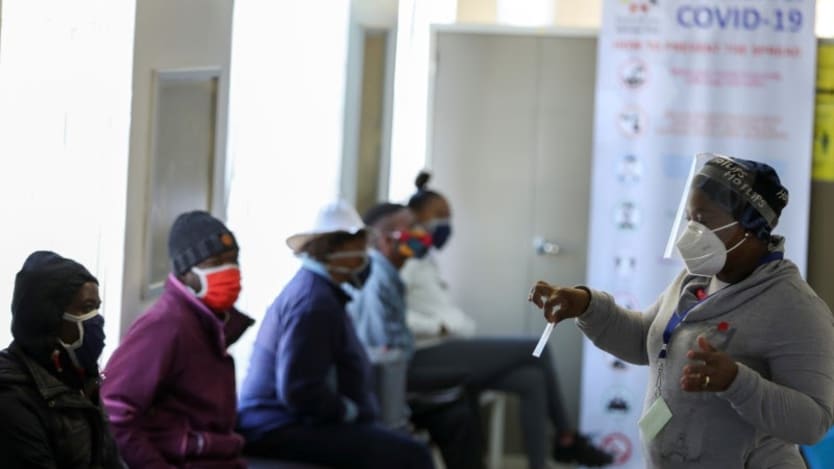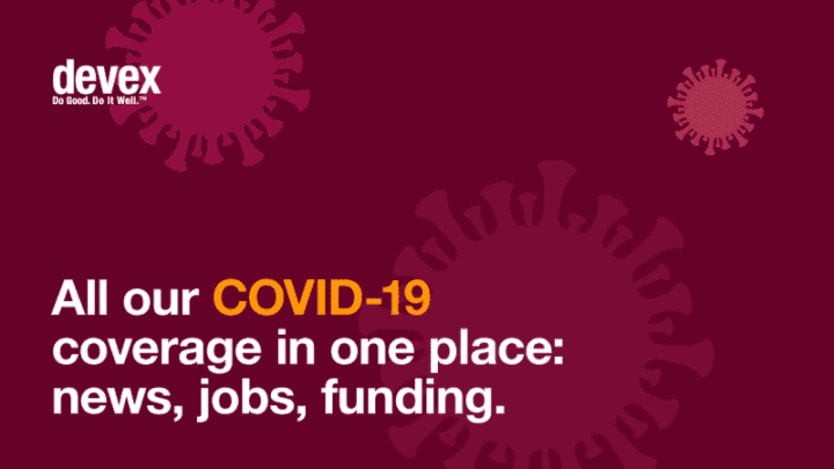
NAIROBI — Drastic measures to contain the spread of COVID-19, such as strict lockdowns, are not sustainable on many parts of the African continent because of crowded living conditions and the need to keep economies afloat. That’s why an effective vaccine is one of the best chances African countries have to return to normalcy, experts said this week.
“A COVID vaccine would allow member states to return to a fully functional economy and society,” said Dr. John Nkengasong, director of the Africa Centres for Disease Control and Prevention, during a virtual two-day conference focused on the role the continent hopes to play in the development, production, and distribution of future coronavirus vaccines.
“We want vaccines to be tested in Africa so we understand the safety and we understand the immune response in African populations.”
— Seth Berkley, Gavi, CEOWhile there have been calls for equitable access to future vaccines, early indications suggest that the playing field might not be equal. Some wealthy countries have already signed agreements with pharmaceutical companies to secure supplies for future vaccines.
“Unless we act now, Africa is at risk of being left behind in the global vaccine,” Nkengasong said.
Some of the challenges leaders on the continent face include raising funds to pay for vaccines, strengthening local manufacturing, increasing the number of local clinical trials, and ensuring communities actually want to be vaccinated.
The conference, attended by government ministers, African Union and World Health Organization officials, researchers, private sector representatives, among others, was a first step toward creating a continent-wide framework on vaccines. The African Union plans to launch its official strategy in the coming weeks.
“This meeting is about the future of Africa and the future of our development. Without an effective COVID vaccine for our continent, our future will be compromised,” Nkengasong said. “We cannot live alongside COVID-19, given the devastation and how dangerous this virus is.”
Mobilizing funds, negotiating with manufacturers
Historically, there have been delays between when new health care technology is discovered and when it becomes widely accessible across Africa.
“For many years Africa has struggled to get access to new technologies, including vaccines,” said Dr. Matshidiso Rebecca Moeti, regional director for Africa at WHO. “It can take a decade for a new technology ... to find its way into African health systems in a way that could be called ‘scaled up.’”
Strengthening Africa’s ability to ‘decode’ the coronavirus
Genome sequencing, used as a technique to track mutations in the coronavirus, can help to ensure that vaccines, drugs, or diagnostic tests work for different strains of the virus circulating globally.
Even when vaccines are available on the continent, there are other barriers to access — especially for remotely located or disenfranchised populations. Because of this, there are still large outbreaks of vaccine-preventable diseases, such as measles, said Daniel Bausch, director of the U.K. Public Health Rapid Support Team.
There are several global mechanisms in place to increase access to future COVID-19 vaccines. This includes WHO’s ACT Accelerator, which is an end-to-end effort to hasten the development of vaccines, and its COVID-19 Technology Access Pool. There is also the COVID-19 Global Vaccine Access Facility, headed by Gavi, the Vaccine Alliance, which aims to pay pharmaceutical companies upfront for doses of future vaccines. The facility would allow for pooled procurement of vaccines between high-, middle- and low-income countries, allowing for equitable distribution.
But these mechanisms still don’t have the widespread support they need to ensure equitable access once vaccines are available, so African nations should also mobilize capital from global donors, as well as domestic resources, to secure an adequate supply of vaccines, Nkengasong said. They should also negotiate directly with manufacturers or countries that have the adequate manufacturing capacity, such as China or the United States.
The African Export-Import Bank is also in discussions with major donor agencies about providing market availability guarantees to help ensure equitable access to vaccines, said Benedict Oramah, the bank’s president.
“It can take a decade for a new technology ... to find its way into African health systems in a way that could be called ‘scaled up.’”
— Dr. Matshidiso Rebecca Moeti, regional director for Africa at WHOManufacturing, regulatory systems, and supply chain
If an effective vaccine is found, it is expected to be — at least initially — in short supply compared to global demand. Bringing local manufacturing to Africa would help ensure that African nations have better access to vaccines, according to conference participants.
There is already existing vaccine manufacturing capacity in Senegal, Egypt, Tunisia, Ethiopia, and South Africa, according to Oramah. These facilities are currently producing other vaccines, but the existing capacity means the continent doesn’t need to start from scratch in terms of expanding manufacturing capabilities to produce a COVID-19 vaccine, said Simon Agwale, CEO at Innovative Biotech in Nigeria.
There is also a solid business case for investment to build out vaccine manufacturing across the continent. About 25% of global consumption of vaccines occurs on the African continent, said Vera Songwe, under-secretary-general and executive secretary of the United Nations Economic Commission for Africa.
In tandem with these efforts, an Africa-specific fund should be created to reward companies with subsidies if they develop or produce vaccines that are made generically available across Africa, said Olusoji Adeyi, senior advisor for human development at the World Bank.
To lay the groundwork for both manufacturing and distribution of vaccines, there should be regional coordination on regulations — a process which should start now, participants said.
Strong regulatory frameworks need to be in place to cultivate local manufacturing to ensure that the products are safe. And for vaccines developed anywhere in the world, a strong regulatory framework is needed across Africa to ensure that once vaccines become available, they are approved quickly in countries.
African nations should also build up their infrastructure now to strengthen supply chains, Bausch said, so that they are ready to distribute a vaccine when it becomes available. Depending on the product, this could include a need to keep the vaccine cold as it moves through the supply chain, which has been a challenge in other vaccination campaigns on the continent, he added.
Finally, there is a need to train enough health professionals to administer a vaccine and monitor its safety, he said.
Trials and trust
Currently, only 2% of clinical trials conducted globally occur in Africa, according to Tom Kariuki, director of programs at the African Academy of Sciences. Western organizations are accused of conducting unethical trials in Africa historically and they continue to be the source of controversy at times.
But if such low numbers of clinical trials continue, it could also hinder the efficacy of a future COVID-19 vaccine for populations across the continent. “We want vaccines to be tested in Africa so we understand the safety and we understand the immune response in African populations,” said Seth Berkley, Gavi CEO.
There are currently over 220 vaccine candidates for COVID-19, said WHO Director-General Tedros Adhanom Ghebreyesus. South Africa announced this week that it will participate in the first vaccine trial on the continent.
Clinical trial capacity already exists in countries across the continent, which have built up track records through research on HIV, tuberculosis, and malaria. Countries with highly developed clinical trial capabilities include South Africa, Kenya, Tanzania, Uganda, and Cameroon, said Salim Abdool Karim, chair of the South African Ministerial Advisory Committee for COVID-19.
But even if a vaccine is proven effective and becomes available in the future, it might not be an easy sell to some communities. In the eastern Democratic Republic of the Congo, for example, there has been resistance to the Ebola vaccine in recent years, with concerns including safety.
Because of this, there is a need for community engagement to ensure that people actually accept a vaccine, and to counteract any misinformation about it. This could include using trusted members of communities, such as religious leaders, as well as the use of COVID-19 survivors to tell the stories of their battles with the disease, experts said.
“Local engagement is the most important thing that we always have to focus on. We consistently, quite frankly, get it wrong,“ Bausch said.
There is also a need to prepare for distributing the vaccine in conflict areas, Bausch said. For polio eradication efforts, for example, the only areas of the world where the global health community hasn’t eradicated wild poliovirus are northern Nigeria, Pakistan, Afghanistan — areas where people are hard to reach because of civil unrest.









